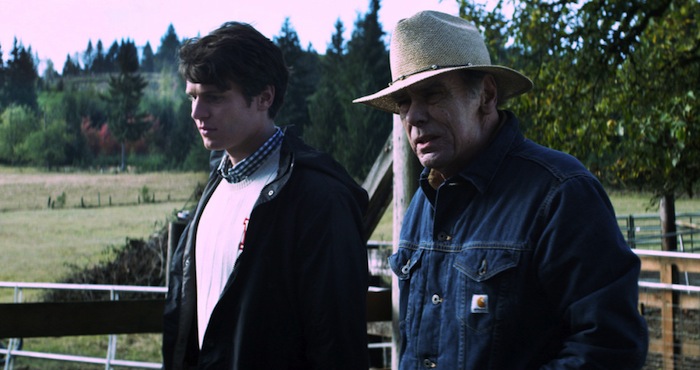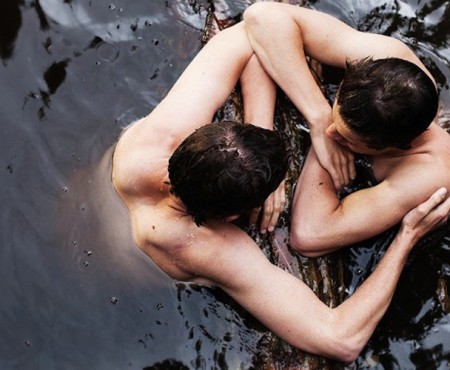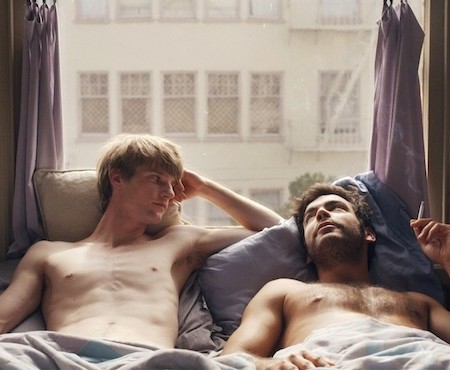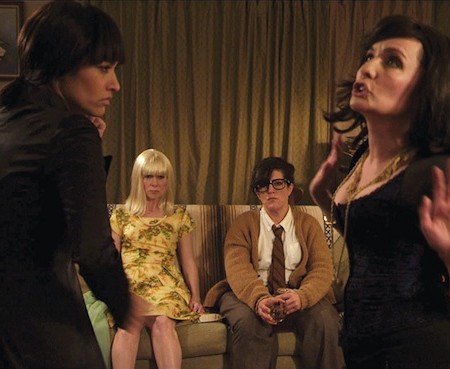Stories about “finding oneself” are all the rage, especially when independent filmmakers go hunting for easy plots. But C.O.G. turns many of the conventions of such stories on their respective heads, which is almost cathartic for any viewer who is tired of them (such as myself). C.O.G. is a promising sophomore effort from Easier with Practice writer/director Kyle Patrick Alvarez, and a great star turn for Jonathan Groff.
Groff is working his usual image of an arrogant prettyboy into something more interesting. Even his douchey, punchable resting face feels like a natural part of his character, David. An upper-crust recent college graduate looking to expand his horizons, David decides to spend a summer working on an Oregon apple orchard. He’s in full-on privileged white person mode, having everyone he meets call him “Samuel” and unironically toting a copy of Walden to read in lieu of actually interacting with his co-workers, who are all migrants. But Samuel finds that physical labor is, surprise surprise, more exhausting than it is artistically instructional, and one misfortune follows another as he finds his comfort continually stripped away.
C.O.G. throws the viewer, though. It starts out as a comedy but morphs into something much more serious as it proceeds. Samuel’s misfortunes get more and more emotionally harrowing, as the harsher bits of reality press down on him. It turns out that this really is a story about learning life lessons – just none of the fun or inspirational ones.
Each time he encounters another obstacle, Samuel tries to gamely match it, only to fail horribly. For example, he attempts to escape the doldrums of his job by courting a coworker (House of Cards‘s Corey Stoll). That usually works out in these kinds of movies, right? But then that coworker turns out to have some… “compulsions” which immediately scare Samuel off. No matter what he tries to do, the kid can’t get it right. Groff embodies his wrongheaded sense of adventure, formed by a misplaced romanticism toward the working class. And it all clicks when it turns out that Samuel is running away from ugliness at home just as much as he’s looking to find himself.
The film delves into especially somber territory in its second half. Having moved on from the orchard and having nowhere else to go, Samuel moves in with Jon, a born-again Christian who’s been haranguing him during his time in the area. Played by Denis O’Hare, Jon is the kind of religious convert who hasn’t so much seen a light as he has merely transferred from one addiction to another. He used to be an alcoholic, and now he gets high on righteousness. But he’s still a frighteningly angry, troubled man. O’Hare plays both sides of that coin, the beatific and the ugly, with a humane, pitiable realism.
However, Samuel’s interactions with Jon also demonstrate a more troublesome side of the film. At the beginning, Samuel rebuffs a bus rider’s attempt to preach to him with that special kind of snootiness that comes from postgrad knowitallism. But as he encounters nothing but homophobia and hostility from the people he meets along his journey, the apparent message is that he was correct in looking down on these people.
And that extends to every attitude Samuel holds. He tries to talk to them about his studying abroad in Japan, but those silly rubes aren’t interested in Japan. In fact, circumstances seem to confirm his prejudices just as often as they rebuff his idealism. One of the migrants steals the cash he has saved up. A sexually frustrated man threatens to rape him. He turns out to be more successful at Jon’s trade of jade carving than Jon is, which earns him the older man’s envious enmity. There’s a strange classist undercurrent in this film, which is at odds with its derision towards its main character’s out-of-touch mindset.
It’s especially strange considering that C.O.G. is generally very empathetic, and all its other aspects are top-notch. The characters feel like people, even the ones with thinner screen time, played by the likes of Dean Stockwell, Dale Dickey, and Casey Wilson. The movie is partially based on one of David Sedaris’s essays from Naked, and it definitely carries his trademark tone of wry, deadpan irony laced with sadness. And it makes rural Oregon look terrific, properly soaked and dreary in a beautiful kind of way.
C.O.G. frustrates in parts, but overall it’s a very good film. The tonal shift from light comedy to much heavier drama might be off-putting to some, but I was impressed by the fluidity of the transition. It’s an interesting respite to the usual tropes of “finding yourself” tales.




















